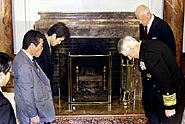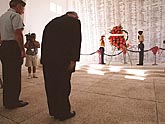Posted on: Sunday, March 11, 2001
Japan failed to express regret for war horrors
 Japanese have apologized adequately for bombing Japanese have apologized adequately for bombing
By Mike Barnicle
We all lived together. My parents, my brothers, my aunt and my grandmother. The apartment was small. There was no privacy and a lot of arguments, mostly about money or, actually, the lack of it.
 |
| In Tokyo, Adm. William Fallon and U.S. Ambassador Thomas Foley bow to express apologies to the families of the victims from the training fishing boat Ehime Maru, sunk by the USS Greeneville. Some Americans question whether the U.S. is apologizing too much in light of the Japanese failure to acknowledge some of its World War II atrocities.
Associated Press |
By today’s standards, we were poor. But we never thought of ourselves as poverty-stricken because every family on our block back then seemed to share the same circumstances — quite happily, too.
We did have one thing that set us apart, though. It was the shrine on the nightstand beside my grandmother’s bed. To her, it was as holy a place as Lourdes.
The centerpiece was a framed photograph of the youngest of her seven children, Gerald. The picture captured him, smiling and handsome, at 22. He wore the uniform of the Army Air Corps.
Alongside his picture was a framed letter on White House stationery signed by Franklin Delano Roosevelt. Lying flat on the top of the table were four small leather boxes like the kind expensive watches come in. Except these boxes each contained a shiny medal adorned with colored ribbons. They were given to my grandmother by a congressman at a ceremony she loved to talk about any time she was asked to explain the awards. The medals were Gerald’s, given to her after he was killed at the Battle of Midway. She never got over it, either.
My grandmother has been dead a good long time now. Yet I thought of her a couple of days ago when I saw a picture in the newspaper. It showed Adm. William Fallon in Tokyo standing alongside the American ambassador to Japan. Both men were bowing to the Japanese prime minister as part of our nation’s apology after one of our submarines struck a Japanese fishing boat in the Pacific south of Hawai‘i, killing nine, including, most likely, four of the 17-year-old students who were on that boat.
According to news reports, Fallon issued a statement, too. It read: "I sincerely and humbly request — on behalf of the United States government, the United States Navy and the American people — that the government and people of Japan accept our apology for the tragic loss of the Ehime Maru. I know my words cannot express the profound sorrow and regret that the American people feel over this tragic event."
It’s nice to know that we’re mature enough to apologize. Why, President Bush sent a letter, Secretary of State Powell called top Japanese officials and the poor captain of the submarine, Cmdr. Scott Waddle, his career ruined, issued his own statement of sorrow.
 |
| Japan Minister of State for Defense Fumio Kyuma bows during a moment of silence after laying a wreath at the Arizona Memorial. The sinking of the Ehime Maru by USS Greeneville raises a question of apology that so far has failed to bridge a U.S.-Japan culture gap.
Advertiser library photo • Sept. 25, 1997 |
But apparently, many people in Japan are still quite angry and don’t think we are sincere. That’s too bad.
Of course, it’s understandable, because nothing we do or say can ever make up for the loss suffered by the families of those who died in the ocean. And that’s where the memory of my grandmother returns.
I’m pretty sure she never received a note or telegram from the leaders of Japan after her son’s plane was shot out of the sky June 4, 1942. And she wasn’t alone. The street where we grew up was a hall of horrors born in World War II.
There was Skippy Burke, a city employee who walked with a limp from grenade wounds suffered at Iwo Jima. Old man McHugh had been at Pearl Harbor when Zeros came out of the sunrise to disrupt a quiet Sunday morning in December. He always said the only thing he wanted to do was go back and visit the watery tomb of 1,700 sailors who were on board the Arizona, but he could never afford it.
"The Japanese have a pretty selective memory," my friend Charley Sweeney pointed out. "And they have a kind of amnesia when it comes to confronting the reality of what they did during World War II — the Bataan Death March, medical experiments on live POWs, using Chinese and Korean women as prostitutes for Japanese soldiers."
Sweeney, now 81, is the only American pilot who flew both atomic bomb runs over Japan. He flew over Hiroshima and three days later — Aug. 9, 1945 — commanded the second mission over Nagasaki. Six days after that, the war ended.
What took place Feb. 9, when one of our submarines crashed through the surface of the Pacific and rammed a fishing boat, was a tragedy. But unlike Pearl Harbor, this was an accident, and we have apologized for it over and over again.
Maybe Japan ought to accept it before more Americans stop to think about the fact that nobody in Tokyo ever told my grandmother and all the others like her that they were sorry for her loss. They didn’t then, and they still haven’t today.
Mike Barnicle is a columnist for the New York Daily News.
[back to top] |


